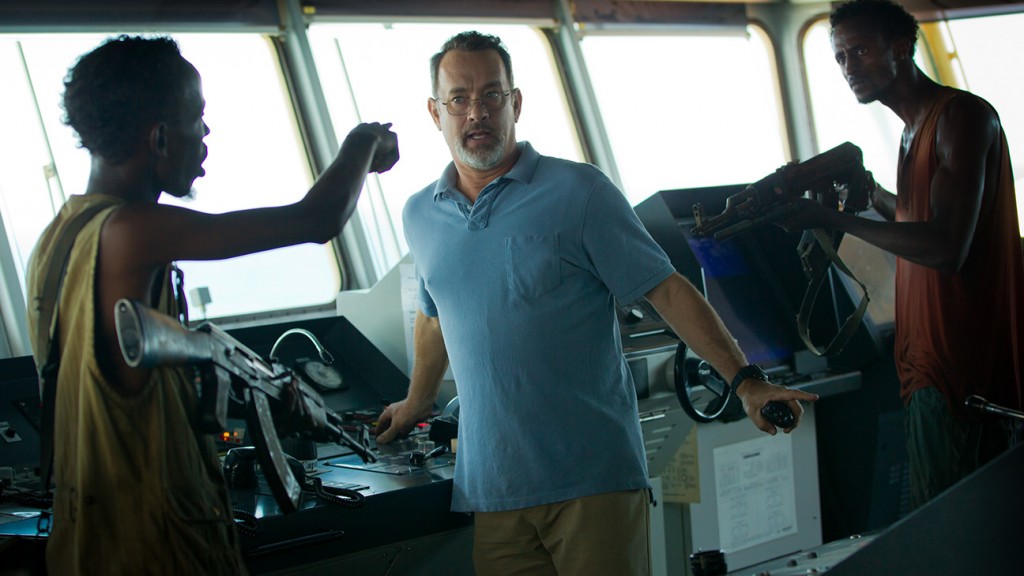Reviews
Movie review: “Captain Phillips”

Captain Phillips
dir. Paul Greengrass
Release Date: Oct 11, 13
- 1
- 2
- 3
- 4
- 5
- 6
- 7
- 8
- 9
- 10
Paul Greengrass tends to be lauded as one of the action blockbuster’s brainier, more politicized filmmakers working today, and after two Bourne installments and a surprise Oscar nod for United 93, here is Captain Phillips, an action film based on the real-life hijacking of the Maersk Alabama freighter ship by Somalian pirates near the African coast in early April 2009. Unlike many of his contemporaries, Greengrass isn’t content to stop at a depiction of the rah-rahing theatrics of the U.S. military in stepping in to negotiate a difficult and potentially treacherous situation. This is a thriller that attempts to see all sides, and even if it doesn’t always strike the right balance, the film’s most affecting beats are, oddly enough, the ones that have the least to do with Capt. Rich Phillips (Tom Hanks) or his crew.
The film begins with two very different kinds of provider setting about the rituals of their day. Phillips is a loving family man who commiserates with his also-overworked wife about the trials of living in America today. “It’s not gonna be easy for our kids,” Phillips says, as wary of what awaits his two children as he is of his own struggles trying to leave something behind for them to make it a bit easier. Elsewhere, Muse (Barkhad Abdi) is selecting a crew for the latest in a recent spate of scores. Muse has found great success sticking up ships in international waters by sticking to a simple strategy: Scare everybody, hold the ship up for ransom, claim money from the insuring companies, return home. As Phillips frets over his new-ish crew with a firm hand, running preparation drills just in case the ship should happen to be attacked, Muse is left to pick from a gaggle of quasi-acquaintances and locals for his own. He selects a group clearly unprepared for the task that awaits them, particularly Bilal (Barkhad Abdirahman), a loose cannon whose temper threatens to upend the mission before it even begins.
Captain Phillips largely unfolds through a series of lengthy, deliberate setpieces. The first and most compelling is the attack on the ship; after ironing out some early kinks, Muse and his depleted crew board the ship with an imprecision that makes their total success all the more frightening. “I’m the captain now,” Muse tells Phillips, forcing the Maersk Alabama’s true captain to guide him around the boat as Phillips uses every gambit he can muster to try and keep the location of his sequestered crew a secret for as long as possible. And once the onboard game of cat and mouse reaches a violent pitch, Muse opts to improvise and claim Phillips as a hostage to ensure that he gets the millions he expected when he woke up that morning.
Despite being the harbinger of a pretty thoroughly awful shaky-cam trend in American action cinema, Greengrass has always had a spectacular handle on how to utilize it in the service of bringing an already tense moment to a boiling point. The early scenes aboard the Maersk Alabama are a master class in small tensions, every errant sound or on-the-fly decision rotating the crew’s survival efforts off their axis. Greengrass’ direction is at the center of this, and he always seems acutely aware of exactly how long to play a moment of tension before it threatens to drag. That the film loses some of this early energy later on is disappointing, then, for the increasingly hazardous conditions on the lifeboat the Somalis hijack offer far fewer opportunities for coiled tension. Once the film enters the lifeboat, it’s a matter of who’s going to blink first and who’s going to make the first power move and, inevitably, how long before the military gets involved and the end is truly in sight.
What keeps Captain Phillips generally engaging during an otherwise draggy second hour, though, is the dynamic between Hanks and Abdi. Hanks delivers his best performance in some time here, maintaining Phillips’ surface sense of calm even as true fear begins to manifest itself behind his eyes and he starts to wonder if there truly is a way out. He’s the consummate negotiator, able to read a situation perfectly except for the few life-threatening moments when he gets it wrong. And as Muse, Abdi is equally great, playing a role that in a less delicately handled movie would have been reduced to a screaming, dark-skinned villain marching to his comeuppance. Captain Phillips is more interested in the universality of struggle, and the ways in which strong-willed men from very different backgrounds learn to survive. At one point, Muse tells Phillips that there’s no work for a man in his country outside of fishing or piracy, and there’s a chilling truth to his words.
At least it’s interested in these dualities to a point. Once the film starts cutting away to military warships planning how to “handle the situation with delicacy” (read: get Phillips to safety before too much word gets out), Captain Phillips becomes a jumble of political notions on which Greengrass doesn’t quite seem to have a handle. For all the film’s early empathy with Muse and his crew, the film’s later sequences often aren’t sure whether to keep that empathy in place or render the crew a band of misfit thieves in a situation in which they’re hopelessly outmatched. Likewise, the ultimate denouement leaves a sour taste in the mouth; it ends in the only way it possibly can, being based on actual events, but nevertheless feels a bit unsavory in its total embrace of the grandiose heroics it staunchly avoids at the start. Captain Phillips is a bit too at odds with itself, a shame given how great the film is when it’s actually good.